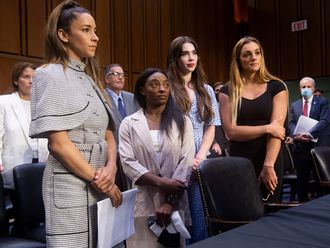WASHINGTON: When the government shut down in late December, Morgan McKay offered free pizza to furloughed and otherwise unpaid federal workers at her popular Denver restaurant, Oblio’s.
McKay expected to host no more than three or four unpaid workers a night. Instead, a dozen or more have appeared nightly, joined by a new crop of paying customers who come to support her efforts.
Shutdown business remains brisk after nearly a month, and she has no plans to stop the deal, despite a growing financial strain.
“The response on all sides has blown me away,” said McKay, 32, who is part of an impromptu and largely uncoordinated effort by businesses and charities to help out an estimated 15,000 workers in the Denver region who have been furloughed or forced to work without pay.
“When word started to spread that we were doing this, other people started showing up” — including, she said, two men wearing cowboy hats who were from out of town and said they were encouraging their friends to come. Other customers have paid to sponsor families of furloughed workers.
“I came from a family that struggled a lot, and I’m a single mom, so it wasn’t hard for me to understand what it would be like to not be getting a paycheck,” McKay said. “A lot of people are having the same thought.”
A makeshift national safety net, stitched together by private businesses, banks, local governments, organised labour and charitable organisations, is spreading slowly and unevenly across the United States as the longest federal shutdown in history staggers to its one-month mark. Predictions of pain that had been theoretical, or theatrical, in shorter shutdowns are now a reality for around 800,000 federal workers, scattered through states red and blue.
The efforts range from the grass-roots to the institutional. Banks and credit unions have suspended late-payment fees on credit cards, and some are offering low- or no-interest bridge loans. Utilities and cellphone companies have also offered to help in varying degrees, and mass transit systems in Florida and other states are providing free or reduced-price rides for those who are furloughed or working unpaid.
The federal government has offered a mash-up of advice to unpaid workers. And agencies have offered sample pushback letters to send to landlords and creditors who demand to be paid, including some that suggested bartering repair work for discounts on rent.
Haydee Guzman, an accounts management employee at the IRS, is receiving no paycheck and has nine mouths to feed: seven children, her medically disabled husband and herself. The predicament pushed her to a food bank in San Antonio, where they live.
“I didn’t want to wait until I would be completely out of funds,” said Guzman, 46. “Let me not wait too long to try to get this type of assistance because we don’t know how long this is going to be.”
Across the United States, the response has been one of worry, warmth and spontaneous action.
Transportation Security Administration officers are reporting that airline passengers have offered words of encouragement, hugs, homemade casseroles, gift cards and even cash — despite airport slowdowns caused by an increase in sick calls by unpaid workers.
But as the shutdown drags on, the need for a more coordinated effort is growing, and the number of groups with the resources to make a real difference remains relatively small.
“I remain an optimistic person by nature, and American men and women are extraordinarily generous, but this is stretching everyone’s resources to the limit,” said Cari Thomas, a retired rear admiral and now the chief executive of Coast Guard Mutual Assistance, which provides financial support for members of the force.
The Arlington, Virginia-based group is one of a few with the resources to provide cash payouts to its members to offset the loss of pay. Thomas said the charity planned to send out checks of $1,000 to younger, lower-paid Coast Guard employees in the next few days, and $750 to those without dependent family members.
The organisation, which has only six full-time employees, has already burnt through its modest cash reserve, taken out a $15 million line of credit and raised about $1.5 million from small donors. The bulk payments would not have been possible without a one-time $15 million contribution from the USAA insurance company, Thomas said, and the group is now looking for another similar contribution to bankroll a second two-week pay period.
“This is very hard on people,” she said. “The people on duty are sad and they are angry and they are frustrated. The civilian employees on furlough feel like they are letting the people in uniform, who are still at work, down. We need this to stop.”
Many of the most effective responses to the shutdown have centered around providing workers with food — a tangible and relatively easy issue to address.
The Tampa airport was one of the first in the country to pull together local agencies, including food banks and a United Way chapter, to create a one-stop resource center for as many as 700 TSA, Customs and Border Protection and Federal Aviation Administration employees who are working without pay.
About 100 employees, with an equal number of family members, on average have been picking up food parcels at a pop-up food bank at a police training facility at the airport. It is run by Feeding Tampa Bay, which typically assists low-income families. Representatives from utility companies and local transportation officials have also been on-site to offer assistance.
“We have never done anything like this, but I think this is not the last time we are going to be doing it,” said Emily Nipps, a spokeswoman for the authority that runs the Tampa airport.
The sense that the shutdown is part of a more lasting national crisis, born of Washington dysfunction, is likely to have a long-term effect on food-relief groups that typically take care of the poor.
“What has struck me is how overwhelmed and underprepared federal workers are for these circumstances: ‘Where do I get food? How do I get rental assistance? How do I get help paying my utilities?’” said Kate Maehr, the executive director of the Greater Chicago Food Depository, which distributes food to pantries throughout Cook County.
Federal employees, shocked to find themselves in such circumstances, have been full of questions about the process and confused about how to get assistance.
In Chicago, home to thousands of federal workers, food pantries were loosening their usual requirements to allow government employees either furloughed or working unpaid to collect food, clothing and other supplies. Care for Real, a food pantry on the city’s North Side, has seen an uptick in calls and visits since last week, and is allowing anyone with government identification to receive goods.
“We want to make sure they know it’s OK to come to us,” said Lyle Allen, the program’s executive director. “Something as devastating as the federal shutdown just causes a catastrophe for their home life.”












